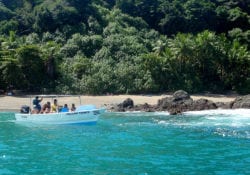Now that you are planning a vacation to Costa Rica, you may want to brush up on your Spanish. Not to worry, Costa Rican Spanish is easy to understand and most Costa Ricans speak very clear and slow and don’t have a strong accent. There are some differences between Costa Rican Spanish and the way it is spoken in other countries. We’ve put together this traveler’s guide to the Costa Rica Language which we hope that you will find helpful. The single most important phrase that you’ll need to learn is “Pura Vida”, if you learn only this phrase it will help you get by during your travels here.
Pura Vida A Way of Life in Costa Rica
“Pura Vida” is a very popular saying amongst Ticos and an integral part of Costa Rican culture. You will be sure to pick it up after staying in Costa Rica for any amount of time. So what does Pura Vida mean? A literal translation to English means Pure Life. But Pura Vida means so much more, it is a way of life. There has been one way that this saying was described to me that stuck, it can be like Hakuna Matata. For those who do not now have the song stuck in their head, Hakuna Matata means no worries. Pura Vida is like that; life should be easy and not filled with worries.
For many Ticos Pura Vida is simply enjoying life and being happy, living life to the fullest because life is short. Being thankful for what you have, knowing that it could be worse. After visiting Costa Rica you will want to claim the Pura Vida lifestyle for yourself, living a peaceful life with an appreciation for your family and friends, also with nature and your own personal life. How is Pura Vida commonly used? It can be used in a variety of ways, from a greeting, saying goodbye, to asking how someone is, a way to express one’s feelings or a personal characteristic.

Some examples of the use of “Pura Vida”:
– How’s everything going?
– Pura Vida!
– Hi, Pura Vida?
– Yes, all is well.
– How are you?
– Pura Vida!
– Did you meet Sara?
– Yes, she is Pura Vida
Haven’t had the chance to experience the Pura Vida lifestyle for yourself? Then come to Costa Rica and embrace what Pura Vida can do for your life!
Costa Rica Slang
- Tico/Tica– a name for a Costa Rican, male and female accordingly. Tico the Sloth is also the name of My Costa Rica’s mascot.
- Mae– equivalent to the word “dude” in English.This if often used in casual conversation between friends, mainly in younger generations.
- Tuanis– cool. You’ll encounter this word more on the coasts, especially if you plan to take surf lessons on some of Costa Rica’s beaches.
- Pura Vida– literally means “pure life”, but it’s an expression of being calm and relaxed. For example, it can be used as a response to “how are you?” or as a response to “thank you.”
- Todo Bien– translates to “everything is good”. Ticos rarely indulge a stranger in a conversation about their problems.
- Macho/Macha– refers to someone with light-colored complexion and/or hair.
- Birra– a word for beer, also known as ‘cerveza’
- Zarpe– Final round of drinks for the night
- Jumas– When you are drunk
- Bombeta– Someone who is kind of crazy
- Que camote– like “how crazy”
- Goma– Hangover. You might hear “Estoy de goma” or “I am hungover”
- Presa– Traffic, or traffic jam
- Despelote– a crazy mess!
- Manda huevo– like “c’mon!”
- Chema– Another word for t-shirt or top
- Brete- An informal word for work
- Chunches– Stuff or things
- Vara– stuff or things
- Chanchito– A piggy bank (makes for a great Costa Rica Souvenir!)
- Mejenga– A soccer game, usually refers to a casual game between friends
- Estuche– stadium
- Suave un toque– Wait for a second, or hold on (you might also hear “suave suave suave” which means “wait!”
- Salado– tough luck, too bad
- Buena nota– cool; or to refer to a good person
- Dar pelota– to pay attention to, or to refer to a person that you like
- Que torta– “What a mess”
- Upe– Use to get someone’s attention. Often used when you are knocking on someone’s door
- Al chile– “Really?!”
- Que lechero– How lucky
- Que tigra– Like “how tiring”. Used when talking about something you don’t feel like doing
- Codo– Used to desribe someone who is cheap. Codo is the world for elbow, so you might see the person touch their elbow when they said this word
- Harina– Another word for money
- Plata– Another word for money
- Rojo– 1000 colones (refers to the color of the bill)
- Teja-100 colones
- Que Chuzo/Chiva– How cool, how great
- Carga– To describe someone who is really good at something, or a good action “que carga” (like que chiva)
- Acachete– To describe something cool, or to say that you are feeling good
- Choza/chante– A house
- Guacala– Pronounced like “Wacala”, used to refer to something extremely gross
- Agüevado– To describe when you are feeling sad or depressed
- Añejo– To describe someone with poor personal hygiene
- Chinear– The act of cuddling. Can also be used to describe a person or animal who is very cuddly “Que chineada”
- Metiche– Someone who interrupts
- Por dicha– Kind of like “Thank God”. For example,”We arrived on time, por dicha.”
- Rajon, Rajona– someone who likes to brag
- Rajado– “Wow” or “that’s crazy” or to describe something ridiculous
- Soda– A small mom and pop restaurant that serves traditional Costa Rican food (gallo pinto, casados)
- Zaguate– A street dog
Additionally, as within any country or dialect, there are quite a few “colorful” expressions as well in common use in Costa Rica language. Those are omitted in this article for our younger readers, although if you ask during your visit, surely you can find a friendly local willing to share these not-so-nice words.
Language of the Caribbean Coast
In the Limon Province of Costa Rica, along the Caribbean Coast, you will find more English than Spanish. Many of the Ticos living there are Afro-Caribs from Jamaica, which is why you’ll hear mostly Caribbean English. In addition to Caribbean English, you might also hear a language called Mekatelyu or Patua, which is combination of English, Spanish and French.
Old English of Monteverde
In 1950, a group of Quakers from the United States settled in Monteverde, Costa Rica. They primarily speak an older version of of English and use “thou” instead of you. When they first arrived, they mainly spoke English, but now the community is largely bilingual.
Common, Yet Confusing Costa Rica Language Phrases To Translate
Quite possibly the first confusing phrase you’ll encounter is “con mucho gusto.” It is much more common to say that, which translates to “with much pleasure” than to use “de nada.”
Costa Ricans are very polite! Additionally, you may be asked, “como amaneció?,” which means “how did you wake up?” Yet, it translates to “Good morning, how did you sleep?”
Also be prepared to hear the word “Dios” or “God” thrown into just about any sentence. When talking about future plans, it’s almost expected that a Tico will say, “si Dios quiere” (God be willing).
Quite Possibly The Most Embarrassing Costa Rica Language Mistakes
In high school or college Spanish, you may have learned that “toalla” means towel. Wrong! In Costa Rica language, it means tampon.
So when asking for a beach towel go with the Tico dialect of “paño.” The other mistake, which is almost too easy to make is when referring to your heat, if you are hot. Now, “hot” can mean two things. One is adult rated, and the other conveys your temperature.
To keep your language PG and to avoid any embarrassing situations, know that “hace calor” means that your temperature is hot. Steer away from “estoy caliente.”
Costa Rica Language “-ico” is Something Small
Adding an “ico” at the end of a word is Spanish designates that the noun being modified is small or fast. For example, “Josito,” would be a man named Jose who may be small in stature, or “gatito” is a small cat. However, in Costa Rica, locals replace the “ico” with “tico.” For example, I will be there in a “ratito” would be changed to “ratico.” It’s cute, but confusing if you’re not aware of this Tico-ism.

 Interested in more information about Costa Rica? Check out the
Interested in more information about Costa Rica? Check out the 





Follow Us